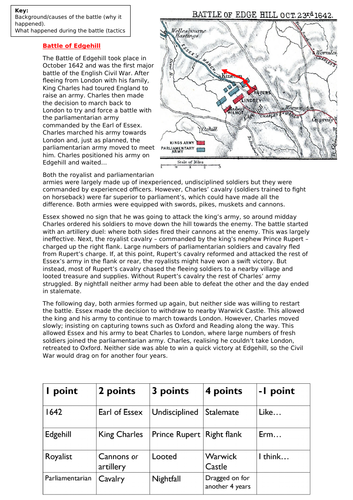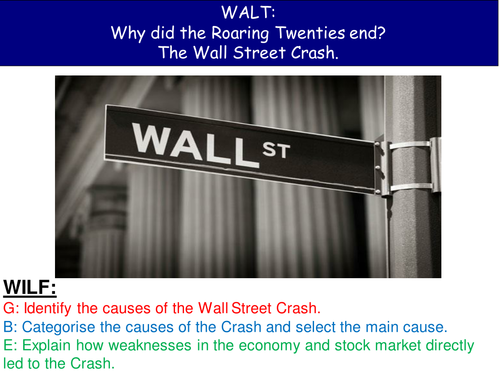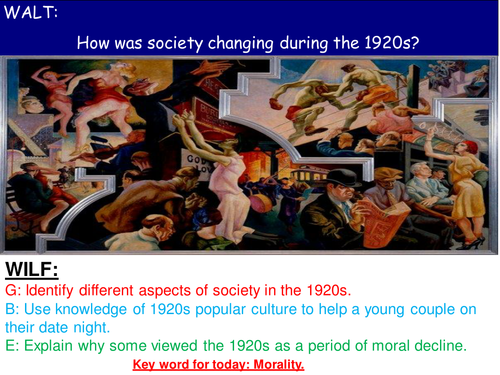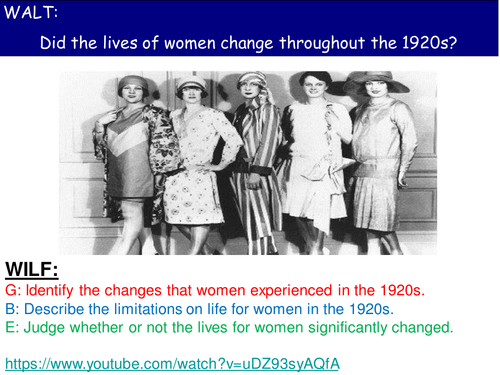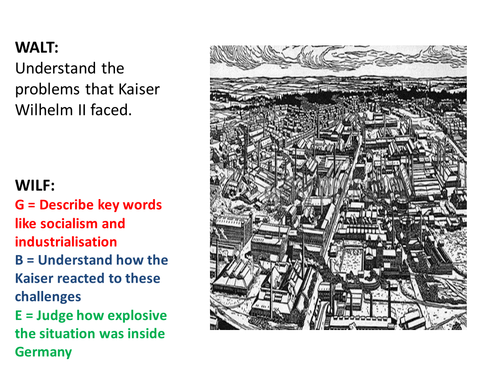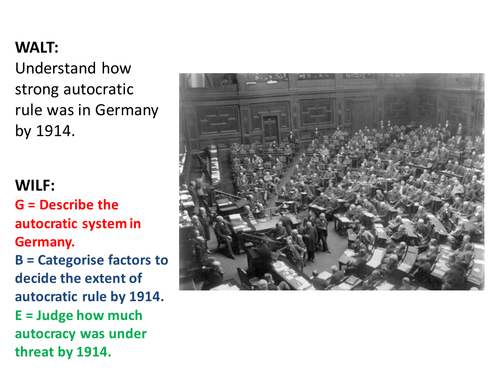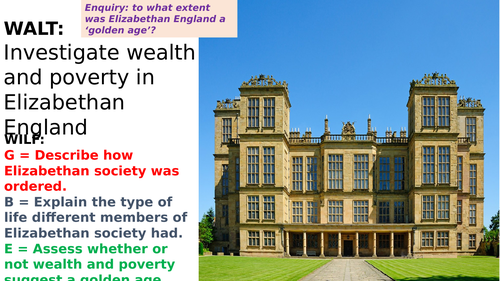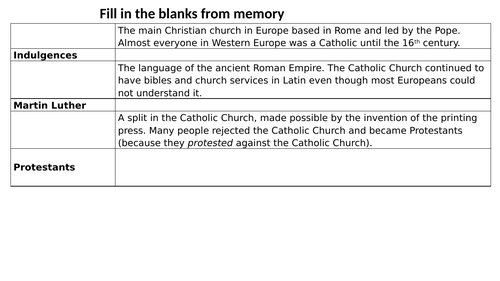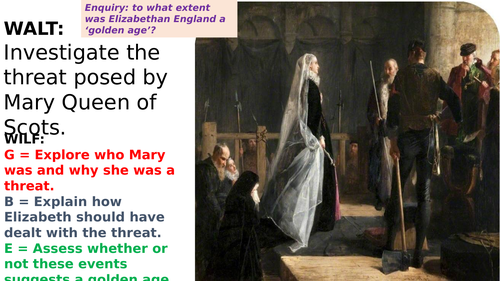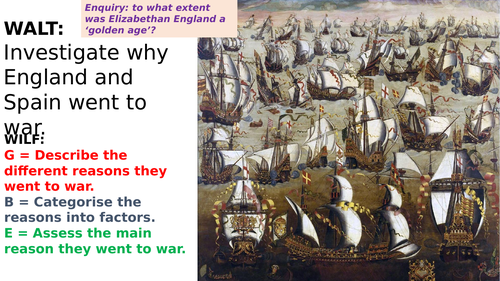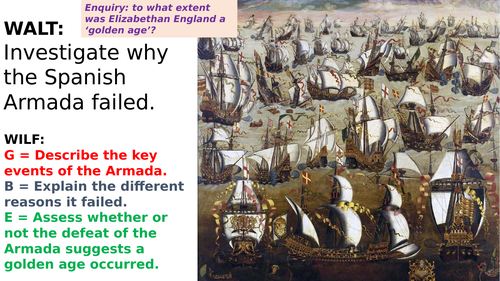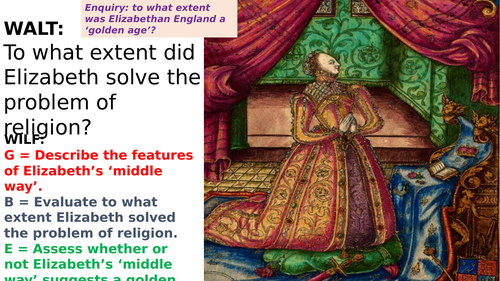
58Uploads
20k+Views
5k+Downloads
All resources

English Civil War Edgehill and Naseby
A self-contained lessons intended to draw comparisons between the Battles of Edgehill and Naseby. Intended for use with Y8.

Who were the Plantagenets? An Introduction
Designed as a Y7 introduction to the Plantagenets, using Matthew Paris’ illustration as a starting point.

AQA GCSE German Navy Laws
Designed to cover part of the new AQA GCSE History ‘Germany, 1890-1945’ topic.

Wall Street Crash Roaring 20s USA
Self-contained lesson on the Wall Street Crash.
Includes instructions for a practical demonstration of the Crash - skittles required!

Women & Flappers in the Roarings 20s USA
Changes and limitations of the life of women in the Roaring 20s.

Kaiser Wilhelm's problems. Industrialisation, socialism and democracy in Germany. AQA GCSE History
Designed to fit in with the new AQA GCSE topic 'Germany, 1890-1945'.

Kaiser Wilhelm II's Germany. How strong was autocratic rule? New GCSE AQA
Designed as a review of the new AQA GCSE topic 'Germany 1890 -1945' from 1890-1914.

Wealth and Poverty in Elizabethan England
This is part of a series of lessons, aimed at Y8, based around the inquiry: to what extent was Elizabethan England a Golden Age? Each lesson comes back to and refers to the arguments of two history teachers: Mr Oldham and Mr Williams.
The series of lessons is as follows:
Inquiry introduction.
Elizabethan Religious Settlement.
Elizabeth and the issue of marriage.
Sailors and exploration during Elizabeth’s reign.
Wealth and poverty in Elizabethan England.
Culture and theatre in Elizabethan England.
Mary Queen of Scots.
Causes of the Anglo-Spanish conflict.
The Spanish Armada.

Culture and Theatre in Elizabethan England
This is part of a series of lessons, aimed at Y8, based around the inquiry: to what extent was Elizabethan England a Golden Age? Each lesson comes back to and refers to the arguments of two history teachers: Mr Oldham and Mr Williams.
The series of lessons is as follows:
Inquiry introduction.
Elizabethan Religious Settlement.
Elizabeth and the issue of marriage.
Sailors and exploration during Elizabeth’s reign.
Wealth and poverty in Elizabethan England.
Culture and theatre in Elizabethan England.
Mary Queen of Scots.
Causes of the Anglo-Spanish conflict.
The Spanish Armada.

Mary Queen of Scots - Elizabethan England
This is part of a series of lessons, aimed at Y8, based around the inquiry: to what extent was Elizabethan England a Golden Age? Each lesson comes back to and refers to the arguments of two history teachers: Mr Oldham and Mr Williams.
The series of lessons is as follows:
Inquiry introduction.
Elizabethan Religious Settlement.
Elizabeth and the issue of marriage.
Sailors and exploration during Elizabeth’s reign.
Wealth and poverty in Elizabethan England.
Culture and theatre in Elizabethan England.
Mary Queen of Scots.
Causes of the Anglo-Spanish conflict.
The Spanish Armada.

Why did England and Spain go to war? Elizabethan England
This is part of a series of lessons, aimed at Y8, based around the inquiry: to what extent was Elizabethan England a Golden Age? Each lesson comes back to and refers to the arguments of two history teachers: Mr Oldham and Mr Williams.
The series of lessons is as follows:
Inquiry introduction.
Elizabethan Religious Settlement.
Elizabeth and the issue of marriage.
Sailors and exploration during Elizabeth’s reign.
Wealth and poverty in Elizabethan England.
Culture and theatre in Elizabethan England.
Mary Queen of Scots.
Causes of the Anglo-Spanish conflict.
The Spanish Armada.

Failure of the Spanish Armada - Elizabethan England
This is part of a series of lessons, aimed at Y8, based around the inquiry: to what extent was Elizabethan England a Golden Age? Each lesson comes back to and refers to the arguments of two history teachers: Mr Oldham and Mr Williams.
The series of lessons is as follows:
Inquiry introduction.
Elizabethan Religious Settlement.
Elizabeth and the issue of marriage.
Sailors and exploration during Elizabeth’s reign.
Wealth and poverty in Elizabethan England.
Culture and theatre in Elizabethan England.
Mary Queen of Scots.
Causes of the Anglo-Spanish conflict.
The Spanish Armada.

Elizabethan Religious Settlement (Middle Way)
This is the introduction to a series of lessons, aimed at Y8, based around the inquiry: to what extent was Elizabethan England a Golden Age? Each lesson comes back to and refers to the arguments of two history teachers: Mr Oldham and Mr Williams.
The series of lessons is as follows:
Inquiry introduction.
Elizabethan Religious Settlement.
Elizabeth and the issue of marriage.
Sailors and exploration during Elizabeth’s reign.
Wealth and poverty in Elizabethan England.
Culture and theatre in Elizabethan England.
Mary Queen of Scots.
Causes of the Anglo-Spanish conflict.
The Spanish Armada.

The Lost Colony at Roanoke (Tudor Exploration and Colonisation)
The mystery of the Lost Colony at Roanoke is explored in this lesson as part of a unit enquiry: ‘how did England become more connected with the wider world between 1492 -1642?’
Includes a video (from Smithsonian channel) introducing the mystery, followed by a task using five pieces of evidence for students to analyse to see what prevailing theories about the fate of the Roanoke Colony are most supported by the evidence. This is followed by an analysis of two interpretations from historians about the fate of the colony. Finally, a ‘counter the codswallop’ plenary.
Intended to be taught to KS3.

Migration to Tudor and Stuart England
Migration to Tudor and Stuart England is explored in this lesson as part of a unit enquiry: ‘how did England become more connected with the wider world between 1492 -1642?’
Includes a starter task based around the 1511 Westminster Scroll (John Blanke), followed by a mix and match task based on migration factors (why migration happens), followed by the main task: a ‘living graph’ to show the different experiences of each migrant group. The migrant groups covered are: Portuguese Conversos, European ‘alien’ migrants, Romani Gypsies, French Huguenots, Africans (‘blackamoors’) and Native Americans.
Intended to be taught to KS3.
Bundle

Was Elizabethan England a Golden Age?
This is a series of lessons, aimed at Y8, based around the inquiry: to what extent was Elizabethan England a Golden Age? Each lesson comes back to and refers to the arguments of two history teachers: Mr Oldham and Mr Williams.
The series of lessons is as follows:
Inquiry introduction.
Elizabethan Religious Settlement.
Elizabeth and the issue of marriage.
Sailors and exploration during Elizabeth’s reign.
Wealth and poverty in Elizabethan England.
Culture and theatre in Elizabethan England.
Mary Queen of Scots.
Causes of the Anglo-Spanish conflict.
The Spanish Armada.
Bundle

'Who were the English?'
This bundle features all the lessons and resources needed to teach the enquiry: ‘Who were the English (before 1066)’?
The enquiry focuses on the skill historical evidence. Overall, students will refer to five pieces of evidence (Roman skeletons discovered at Aballava fort, Sutton Hoo helmet, Bede’s account of Hadrian and Theodore, the Viking Domesday Stone, and a coin from the reign of King Æthelstan) in order to answer the enquiry question.
The resources on the PowerPoints are hopefully self-explanatory in terms of how to deliver it to students. But there are brief instructions in the descriptions for each lesson.
You can download the corresponding student booklet for free with all the required work sheets and resources.
The lesson sequence for this enquiry is as follows:
Roman Skeleton Mystery (2 lessons).
Anglo-Saxon Kingdoms and Sutton Hoo (2 lessons).
The Spread of Christianity in England.
Viking Raid on Lindisfarne.
Æthelstan, King of the English
Review lesson: Who were the English (before 1066)?

